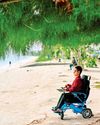
THE "FOREIGN HAND" is a familiar trope in Indian politics. As a tumultuous 2024 drew to a close, it was back in circulation. The Parliament's winter session was in a logjam as the principal opposition, the Congress, and the ruling BJP traded allegations over corporate ties, tinged with accusations of foreign influence. The opposition protested the US market body's indictment of billionaire Gautam Adani, perceived as close to the current dispensation. The BJP hit back with Congress leaders' alleged links to George Soros, the Hungarian-American billionaire who it accused of attempting to destabilise the Modi government.
An uneasy truce was brokered as both sides agreed to discuss the 75 years of the Constitution of India. However, that quickly devolved into blame games. The winter session also saw mistrust between the chair and the opposition. In an unprecedented move in India's parliamentary history, a no-confidence motion was brought against Rajya Sabha chairman, Vice President Jagdeep Dhankhar. The motion was rejected by deputy chairman Harivansh Narayan Singh.
Generally, at the heart of these frequent disruptions is the opposition's insistence on discussing contentious issues, which does not appeal to the government. During the second tenure of Congress-led United Progressive Alliance government, the BJP paralysed the functioning of the Parliament over the coal and 2G scams. Back then, Arun Jaitley, the leader of the opposition in the Rajya Sabha, defended protests as an "intrinsic part of democracy", arguing obstruction was sometimes necessary to hold the government accountable.
This story is from the January 05, 2025 edition of THE WEEK India.
Start your 7-day Magzter GOLD free trial to access thousands of curated premium stories, and 9,000+ magazines and newspapers.
Already a subscriber ? Sign In
This story is from the January 05, 2025 edition of THE WEEK India.
Start your 7-day Magzter GOLD free trial to access thousands of curated premium stories, and 9,000+ magazines and newspapers.
Already a subscriber? Sign In

Walking in pine forest can have the same effect as a prescription drug
INTERVIEW - KATHY WILLIS, professor of biodiversity, the University of Oxford, and author, Good Nature

MORE THAN A HELPING HAND
Maria Victoria Juan spent a lifetime healing wounded soldiers, and she can't think of anything she could have done better

Against all odds
Mohamed Raishan Ahmed was born with spinal muscular atrophy, which made him unable to sit, stand or walk. Recently, the Maldivian underwent a rare, complex surgery in India that now allows him to sit upright. At 23, the fact that he is alive is in itself an achievement. But he has gone beyond mere survival-with a pursuit of excellence

A pacemaker tale
From science fiction to reality, with a touch of southern Indian wisdom

Driving safe
Taxi drivers endure gruelling hours, cramped seats and relentless traffic, making them prime candidates for health issues like back pain, hypertension, diabetes and insomnia.

Good food, good life
From the moment of birth, we establish a relationship with food—a nourishing link that requires care and attention to stay healthy

POOR SLEEP IN MIDLIFE COULD AGE YOUR BRAIN FASTER
PEOPLE WHO EXPERIENCE SLEEP ISSUES, such as difficulty falling asleep or staying asleep in their 40s, may show more signs of brain ageing in late midlife. Poor sleep may accelerate brain atrophy that is associated with dementia.

BRAIN SCANS SHOW MINDFULNESS MEDITATION CAN REDUCE PAIN
CAN MINDFULNESS MEDITATION actually relieve pain, or is it just a placebo effect?

NON-SURGICAL OPTION TO EASE KNEE ARTHRITIS
A NEW, MINIMALLY INVASIVE procedure called genicular artery embolisation (GAE) can effectively reduce pain, improve quality of life and reduce progression of the disease and the need for knee replacement surgery in people with knee osteoarthritis.

EARLY ONSET DIABETES, BELLY FAT LINKED TO DEMENTIA
FACTORS SUCH AS DIABETES and belly fat in midlife can put you at risk of dementia and Alzheimer's disease later in life.